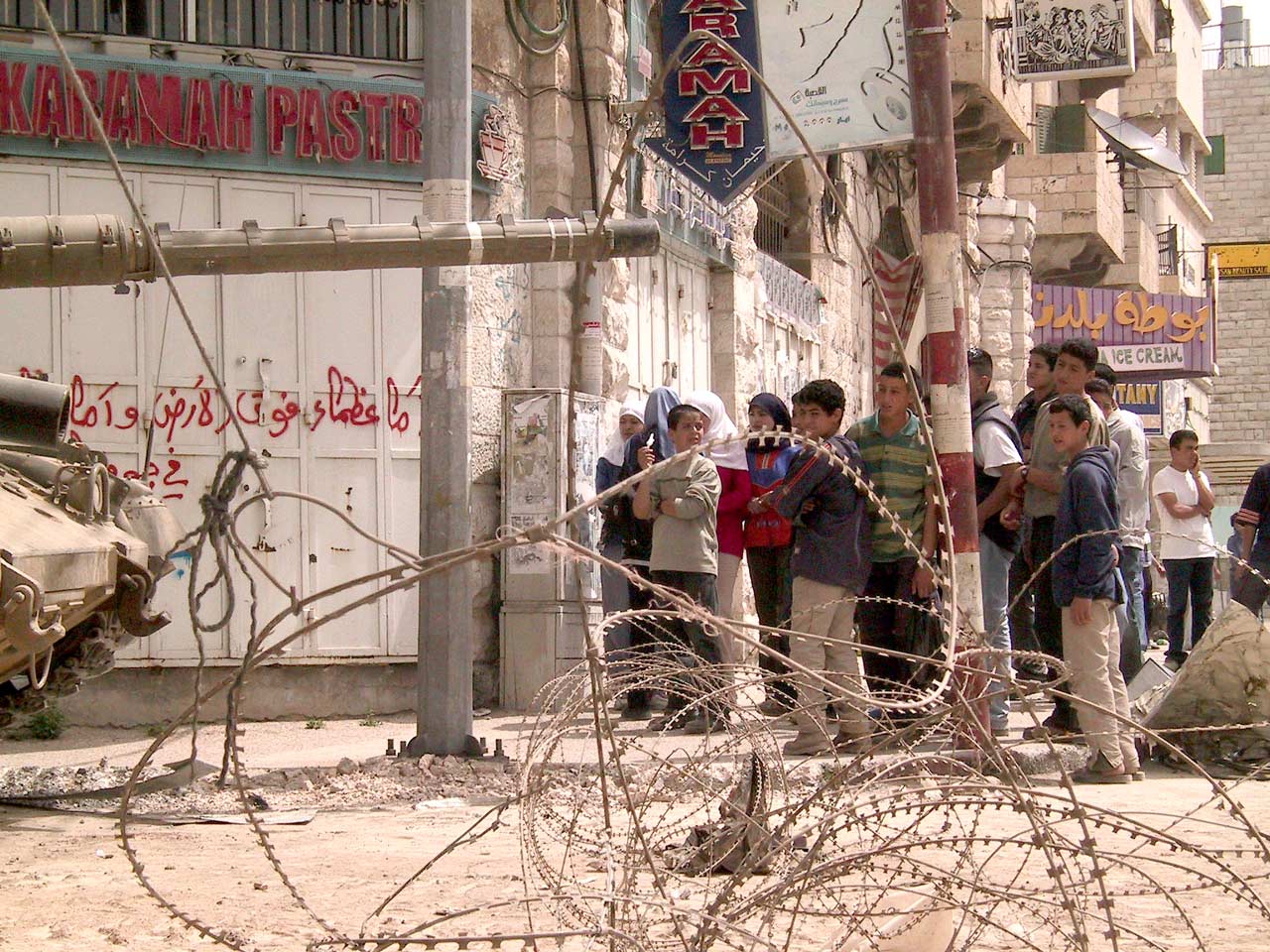
Children in Ramallah gather near an Israeli tank during a brief lifting of the curfew imposed on the city during a military invasion in April 2002. Ramallah was placed under curfew for nine months that year. Mike Merryman-Lotze / AFSC
A few weeks ago, a Palestinian gunman from the West Bank city of Jenin killed three Israelis in Tel Aviv. This attack followed three other attacks in Israel, two carried out by Palestinian citizens of Israel and one by another Palestinian from Jenin. A total of 14 people were killed in these attacks.
In the wake of these killings the Israeli military has raided Jenin and other cities in the West Bank, arresting hundreds of Palestinians, and destroying homes. At least 20 Palestinians have been killed by the Israeli military, including at last two children. Six Palestinians were killed in a 24-hour period between the 13th and 14th of April. Hundreds more Palestinians have been injured. This violence is tragic, and at AFSC we remain committed to working for an end to violence and harm.
As we work for that change, it is important to remember that violence did not start with the recent attacks by Palestinian gunmen. In the first four months of 2022, at least 25 Palestinians were killed and over 3,700 injured by the Israeli military. During the same period, the Israeli military demolished over 330 Palestinian owned structures, impacting more than 1,300 people. As has been detailed by groups like Al-Haq, B’tselem, Amnesty International, and Human rights Watch, Palestinians live under a system of Apartheid, and that system is maintained through violence.
When I first heard about the attack in Tel Aviv, I was immediately brought back twenty years to 2002 when I took the LSATs in Tel Aviv. At that time, I was living in Ramallah, and we were under curfew, with limits on movement. We spent nearly nine months under some form of curfew that year. Soldiers were in the street every day. We fell asleep each night to the sound of gunfire and were woken in the night when Armored Personnel Carriers and Tanks drove by the house.
I arrived in Tel Aviv a day early because there was no way I could make it there from Ramallah in time to start the morning test if I left Ramallah on the day of the exam. It took hours to get from Ramallah to Jerusalem, a distance of only a few miles.
I stayed at a hostel near the test location. I arrived at the hostel and locked myself in my room. I had been living under curfew for months, but I couldn't bring myself to go out in Tel Aviv. The bars were open and full. People were walking in the streets. The beach was only a few blocks away, and people were frolicking in the surf.
I was seething with anger. From some places in Ramallah, we could see the lights of Tel Aviv at night, but difference between the two places could not have been more stark. The inequality was glaring. The unquestioning acceptance of oppression was infuriating. And the anger and frustration that I experienced at that time as a privileged foreigner who had only lived in Palestine for a few years cannot be compared to the experience of Palestinians whose whole lives are lived in a situation of Apartheid.
I mourn all loss of life and hurt. I want an end to violence. But violence is not only manifest in attacks and killings. There is violence inherent in occupation and Apartheid. As long as those systems are maintained, there will be attacks.
The Israeli response to recent attacks has been predictable and replicates what has been done in the past. Cities are being invaded. People are being arrested and will be tortured in detention. Homes are being demolished. Rights are being restricted. People are being killed.
These actions will not bring peace. The answer to attacks is not more restrictions, more raids, more arrests, more torture, and more killing. The answer to attacks is the creation of a reality where rights are respected, where people are equal, and where the Apartheid system is ended. Only justice will bring peace.
